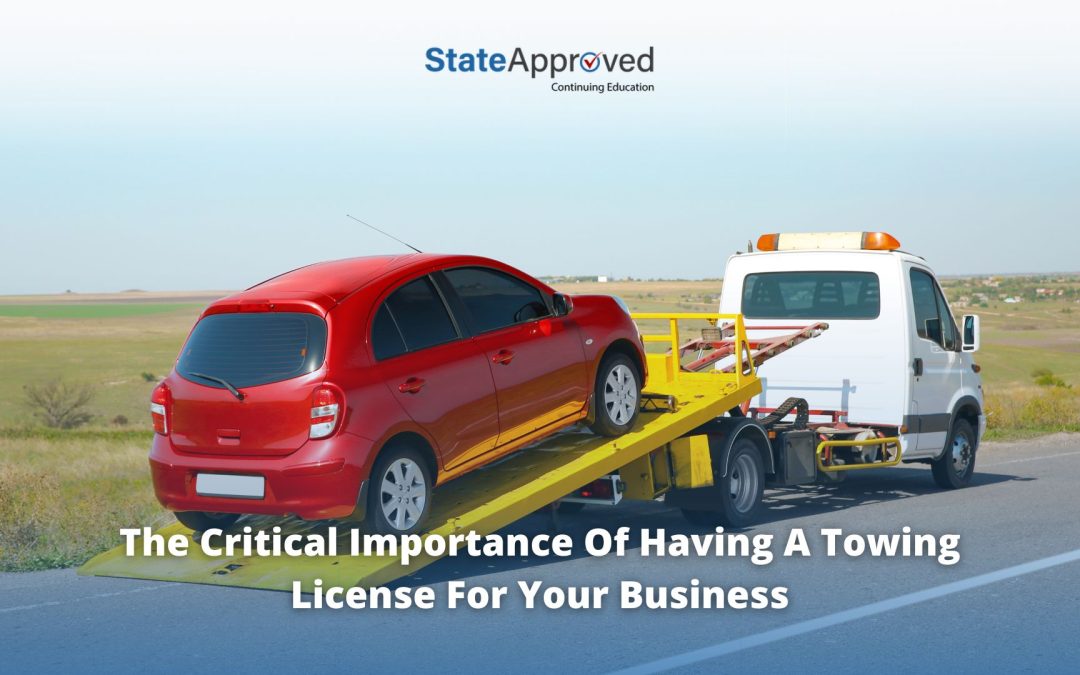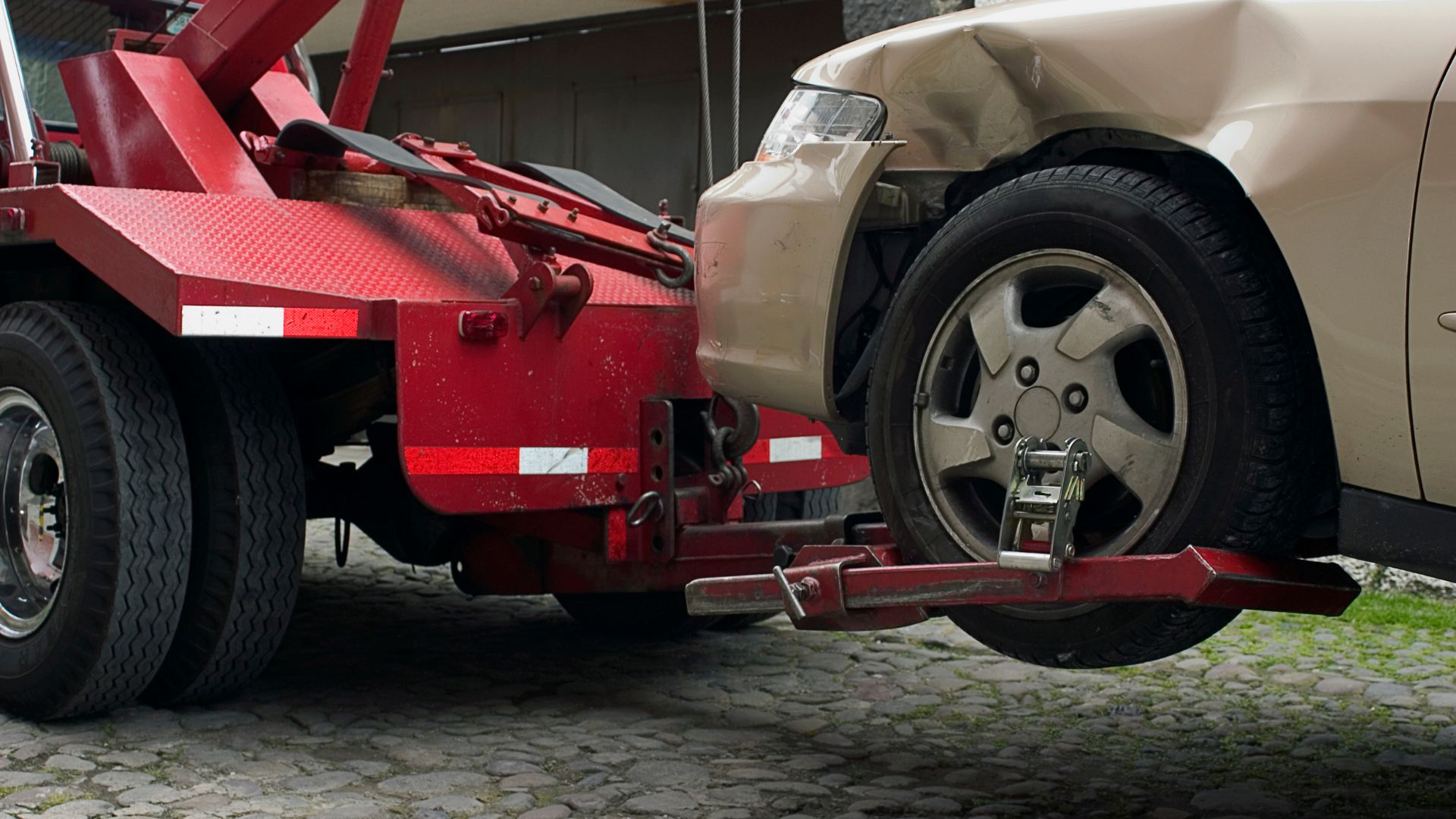Why is having a towing license crucial for your business? Having a towing license for your business ensures you comply with legal requirements, maintain safety standards, and build customer trust. In this blog, we’ll cover how a towing license impacts your operations, safety, and reputation and why it’s a must-have for any towing business.
Key Takeaways
- A towing business must obtain the necessary licenses and permits to ensure legal compliance and operational safety, including a tow truck permit and commercial driver’s license.
- Safety and professionalism are critical for a towing business, emphasizing the importance of operator training, vehicle inspections, and adherence to safety regulations to build customer trust.
- Maintaining a valid towing license involves ongoing compliance, renewal processes, and continued education to avoid legal penalties, protect the business’s reputation, and enhance service credibility.
Legal Requirements for Operating a Tow Truck Business
Securing the appropriate licenses and permits is a crucial step in establishing a tow truck business. It’s mandatory to obtain a tow truck permit for lawful operations, and every towing company must have a business license. The specific types of permits needed can vary depending on location due to differences in local regulations. These may include requirements for impounding vehicles or separate mandates for consensual versus non-consensual towing.
To avoid legal complications and potential fines that could hinder your business activities, adherence to these regional laws is critical. Tow truck businesses are expected to follow local guidelines strictly, ensuring their drivers possess the necessary credentials like a commercial driver’s license as well as an operator license specifically for handling certain types of tow trucks.
It’s imperative for tow companies that both their commercial and tow vehicle comply with area-specific standards, which involve periodic inspections confirming roadworthiness along with adherence to safety protocols. By observing these directives, a tow company not only avoids legal troubles but also promotes its dedication to safety and professional conduct within the industry.
The acquisition of requisite licenses and permissions constitutes the cornerstone of launching any successful enterprise within the sector. It enforces regulatory conformity alongside endorsing safety measures coupled with proficient service provision, all significant traits aimed at fostering credibility amongst clientele while deftly managing through the intricacies inherent in operating within such an industrious marketplace.
Ensuring Safety and Professionalism
Establishing a well-regarded towing business hinges on adherence to safety and maintaining a professional manner. To achieve the necessary qualifications and build trust, operators are trained in recognized programs that cover key competencies, including the secure transportation of vehicles, emergency response tactics, and customer relations. Operators must engage in meticulous planning and preparation to proficiently manage any challenges they might encounter throughout their towing duties.
Incorporating appropriate safety equipment, conducting detailed inspections of tow trucks, and employing proper techniques for securing vehicles significantly reduce hazards associated with towing tasks. Faithfully following established safety protocols not only ensures the welfare of both personnel and clients’ assets but also cultivates an environment of dependability within the client base. A legitimate license is proof that these operators have mastered their craft according to industry standards—demonstrating commitment towards upholding exceptional levels of security as well as professionalism.
Strategic routing, coupled with adeptness at navigation, contributes greatly toward delivering swift yet safe services when transporting vehicles. When all elements related to hauling operations—from initial precautions through execution—are carried out conscientiously under principles governing both prudent measures and superior service delivery practices, it fosters robust credibility among customers seeking reliable assistance during stressful situations where vehicular movement is necessary.
Building Trust with Customers
Customer trust is crucial for the success of any towing business. A valid towing license signifies credibility and professionalism in the towing industry, reassuring customers that they are dealing with a legitimate and qualified service provider. The knowledge and training from obtaining a towing license further reinforce credibility, preparing operators for various situations.
Excellent service is key to building a strong customer base. This includes transparent pricing and clear communication about the services offered. Customers who know what to expect and feel treated fairly are more likely to trust and recommend your business. Consistently delivering high-quality service establishes a positive reputation and encourages repeat business.
Strong relationships with local businesses and property owners enhance your towing company’s reputation. Collaborating with repair shops, gas stations, and other local businesses increases your visibility and attracts more clients. Hiring employees committed to professionalism and customer service further strengthens your business’s reputation.
Avoiding Legal Penalties and Fines
Operating without proper licenses and permits can have severe consequences for your towing business. Fines and penalties for non-compliance can substantially impact your business’s financial health and reputation. Keeping all licenses and permits up-to-date and compliant with local regulations helps avoid legal pitfalls.
Non-compliance can lead to denial, suspension, or revocation of operating certificates. This can halt operations and result in a loss of customers and revenue. Staying informed about legal requirements and maintaining compliance protects your business from legal issues and ensures long-term success.
Collaborating with local law enforcement and understanding private property permit requirements help avoid legal complications.
Insurance and Liability Coverage
Obtaining a towing license is typically necessary to secure insurance for those in the towing industry. It’s compulsory for tow truck enterprises to have coverage that includes liability, property damage, and workers’ compensation insurance. General liability insurance offers protection against claims from third parties related to injuries or property harm incurred while conducting towing operations, thus shielding your enterprise from legal challenges.
Garage keepers’ liability insurance ensures vehicles are safeguarded under your custody, while on-hook coverage provides protection for vehicles being transported. Insurance covering commercial property safeguards tangible assets such as tow trucks and gear against perils like theft or acts of nature. In the event covered damages cause business suspension, business interruption insurance reimburses you for revenue loss.
Insurance dealing with commercial automobile liabilities addresses physical injury and destruction of properties resulting from mishaps involving tow trucks. Umbrella insurance provides additional layers of liability assurance above what typical policy limitations offer. This serves as a defense against substantial settlements or judgments. To achieve all-encompassing security within your policies, it is critical to fulfill certain required minimums regarding bodily injury and property damage coverage.
Selecting appropriate insurance arrangements secures your venture against economic pitfalls while simultaneously elevating its reputation along with reliability levels among clientele who find reassurance in knowing that the firm they’re entrusting their needs with maintains full comprehensive insulation, ready to tackle any predicament throughout its hauling endeavors.
Enhancing Business Opportunities
Acquiring a towing license can lead to a variety of new opportunities, such as initiating your own towing company or collaborating with existing towing businesses. Forming relationships with law enforcement agencies may result in agreements for the removal of vehicles involved in accidents or those that have been abandoned, offering consistent work and significantly enhancing income. Consistent job flow is also assured through partnerships with roadside assistance organizations, which help maintain a reliable customer base.
Cultivating connections with community enterprises like auto repair shops and fuel stations can Increase your business’s exposure and clientele. These collaborations establish referral networks that funnel additional clients to your services. By securing arrangements with diverse entities, you not only broaden your range of offerings but also bolster revenue streams—fostering greater resilience and flexibility for your enterprise.
To maximize the potential within the industry, investment in specialized machinery coupled with the employment of proficient staff members is crucial. Broadening service options to include tasks such as heavy-duty towing or providing emergency roadside aid attracts an expanded market segment. Implementing an effective marketing plan that highlights both your capacity for handling various jobs and your professional manner will propel growth and prosperity within your towing venture.
Read more: The Critical Importance of Having a Towing License for Your Business
Steps to Obtain a Towing License
To become a professional tow truck operator, individuals must first meet the eligibility requirements set by their state or regulatory agency. This often includes obtaining a business certificate, submitting vehicle details that comply with towing regulations, and undergoing background checks. Additionally, an inspection of the operational facility and towing equipment is typically mandated to confirm adherence to safety and regulatory standards.
While initial licensing is essential, it is equally important to remain informed about changes in laws and operational requirements through regular continuing education. Rather than navigating licensing procedures independently, aspiring professionals are encouraged to complete certified training and education programs that help them prepare for both licensing exams and real-world responsibilities. These programs also help operators understand legal nuances, safety expectations, and industry best practices that are critical to long-term success.
Instead of attempting to manage every aspect of the licensing process alone, professionals benefit greatly from engaging with licensed training providers who understand compliance and can help ensure each step is completed accurately and efficiently.
Read more: Laws Governing Tow Truck Operators in Texas
Maintaining Your Towing License Through Continued Education
To retain an active towing license, it’s critical to comply with renewal schedules, engage in certified continuing education, and stay current with evolving industry standards. Many states require license renewal on an annual basis, and missing a renewal deadline can result in penalties or suspension of operations.
Continued education plays a pivotal role in the license maintenance process. Through approved courses, operators strengthen their knowledge of industry updates, including new safety regulations, ethical standards, and legal compliance issues. These programs ensure that operators not only meet regulatory obligations but also improve their service delivery and operational readiness.
Tow truck operators are also expected to maintain their vehicles to professional standards, which includes routine inspections and preventive maintenance. Training programs emphasize the importance of vehicle readiness as part of comprehensive service compliance. Enrolling in professional CE courses helps ensure operators meet these requirements and consistently deliver top-tier service.
Read more: How To Renew a Tow Operator License in Texas?
Summary
In conclusion, obtaining and maintaining a towing license is crucial for the legitimacy and enduring success of your towing business. It involves understanding legal obligations, adhering to safety regulations, securing appropriate insurance, and staying informed through continuous education. These elements are vital for establishing a credible, professional, and fully compliant operation.
At State Approved Continuing Education, we offer licensed, online continuing education programs designed to assist towing professionals in towing licenses in Texas, helping them stay compliant, expand their knowledge, and efficiently renew their licenses. By enrolling in our state-approved courses, towing experts gain the insights and certification necessary to operate with confidence, professionalism, and legal assurance in a competitive industry. Ready to elevate your towing business to new heights? Contact us today!
Frequently Asked Questions
How often do towing professionals need to complete continuing education?
Most states require tow operators to complete continuing education every year or two, depending on licensing regulations.
Can continuing education impact insurance rates for towing businesses?
Yes, maintaining proper training and certifications may help demonstrate lower risk, which some insurers consider when setting premiums.
What topics are typically covered in towing continuing education courses?
Courses often include safety procedures, legal compliance, customer service, and industry best practices.



